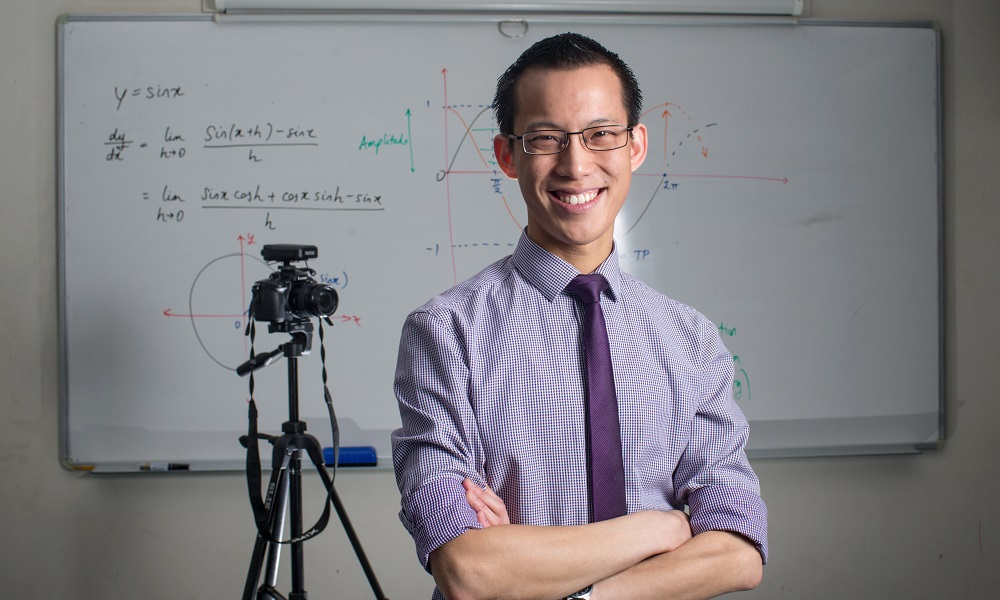The Global Teacher Prize awards US $1 million each year to one teacher who has made a remarkable impact as an educator. Last year, the prize was awarded to Maggie MacDonnell from a remote school in Canada. In this article, we speak to 2018 Top 10 finalist Eddie Woo from Cherrybrook Technology High School in New South Wales.
It's been a phenomenal 12 months for Eddie Woo. The maths teacher from Sydney's Cherrybrook Technology High School has just been named a Top 10 finalist in the US $1 million Varkey Foundation Global Teacher Prize.
The announcement comes after Woo delivered the Australia Day address, received the 2018 Australian of the Year Local Hero Award and was one of 12 recipients of the Commonwealth Bank Teaching Award, which is presented in partnership with the Varkey Foundation and Schools Plus. Sarah Mathews and Charlie Klein – fellow recipients of the Commonwealth Bank award – made the top 50 shortlist in the Global Teacher Prize.
Apart from his dedication to his popular YouTube channel, where he uploads recordings of his maths lessons, Woo has acted as an innovative teacher offline, too. He was responsible for creating the MathsPASS (Peer-Assisted Study Session) program at his school, where younger students are paired with older students during lunchtime to help them with maths problems. ‘I want them to have someone they can access and ask questions to that could help them say “alright, in my class of 30, I sort of never really get enough time with my teacher to ask all the questions that I need. Maybe I can ask somebody else and they can help me.”'
This idea stemmed from the fact that Woo found that at such a large school, he was dealing with students entering Year 7 from 20 to 30 different schools, which meant they had very different mathematical backgrounds, and were all at different levels in terms of mathematical concepts.
Along with dealing with a class of students sitting at different capability levels, often comes the issue of maths anxiety – a topic we've explored before at Teacher. It's something Woo says he deals with every day, in every class, even with high-performing students.
‘Sometimes it will take me a whole month of working with students and actually telling them it's okay to be slow with mathematics. The most important thing in mathematics is not speed, it's the ability to slow down and ask the right questions. It's okay to make mistakes. Actually, mistakes are so wonderful because you make a mistake, you learn from it and that's the most important thing … my students have actually gone through their entire schooling, 10 to 15 years, being taught that both of those things are wrong.
‘So, helping students grapple with that, and not judging them and helping them see that they're accepted in the classroom and it's safe. It's really important to help students know you're not going to jump on them, you're not going to make them feel belittled because they can't get an answer. Every day that I'm in the classroom, I do that.'
As for implementing a program like the MathsPASS Program – where students need to be convinced to give up their lunchtime – Woo says although there was immediate interest across the school, what has been most difficult has been encouraging students to stick with the program as there is competing demand among other faculties for how they choose to spend their lunch break.
‘As soon as the kids get into the program they realise how much they gain from it … a lot of people feel like if they don't have instant success at something, they're probably good at something else, so just give up and move on. And I really believe that everyone can succeed mathematically if they stick with it.'
Another vital part of Woo's lessons is contextualising the content. ‘[Students will say to me] “hey, sir… we don't want you to get the wrong idea, we're not maths kind of people. Don't be under any illusion that we're going to be any good at this, that's not why we're here”. I relish taking on that challenge. And, for me, any teenage boy who is into sports, no matter how many times they tell you they're not into maths, they can quote hundreds of statistics to you about their favourite team and their favourite players, that's so natural to them … so that's the first big, important thing, showing a connection to their lives.'
Most recently, Woo has started a second YouTube channel, this time aimed at pre-service teachers. Since the success of his videos, which he makes for his students, Woo realised most of his viewers were actually pre-service teachers. To cater for these viewers, he has now developed a second YouTube channel with content produced specifically for teachers.
‘I remember I was chatting to a third year maths education student, and she said to me “Oh, I was doing an assignment and we had to prepare a lesson plan and I watched so many of your videos to help me prepare for that”. And I still remember that when I was at university … I spent two months in schools which, really, is a tiny amount of time.'
Woo affirms that nothing prepares you for being in the classroom apart from your first time being there as a classroom teacher. He says, through his videos, pre-service educators are able to observe what a classroom dynamic is actually like without being there in the room and acting as a distraction to the students, which often makes students behave differently.
‘Pre-service teachers get such a small window to observe what a teacher looks like in a real class … so I came to realise that my YouTube channel just gave these students a window that they've never had into what a regular classroom looks like.'
The winner of the Global Teacher Prize is announced live in Dubai at an award ceremony in March. Stay tuned for two more articles on Australia's Top 50 nominees – Charlie Klein and Sarah Mathews – and more on the top 10 finalists.
In order to ease maths anxiety in students, Eddie Woo ensures he reminds students that being slow at mathematics is not a negative thing. How do you work towards easing performance anxiety in your classroom?



